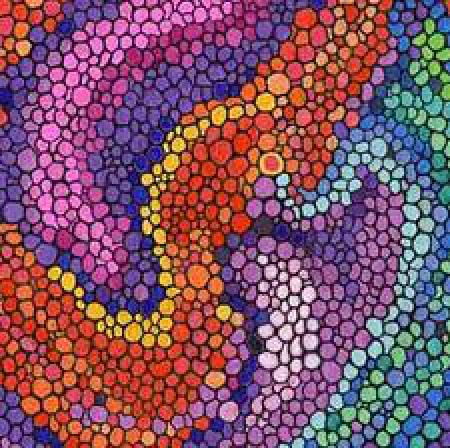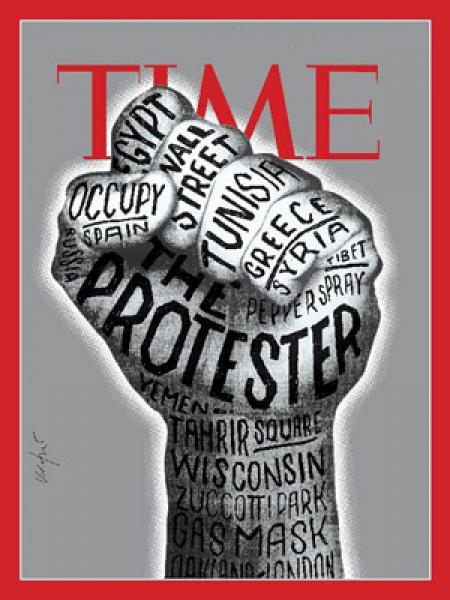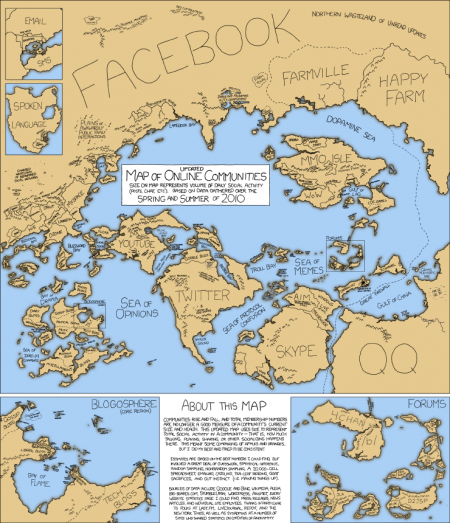Serendip is an independent site partnering with faculty at multiple colleges and universities around the world. Happy exploring!
Literary Kinds 2012

Welcome to Literary Kinds, an English course offered in Spring 2012 @ Bryn Mawr College. This is an interestingly different kind of place for writing, and may take some getting used to. The first thing to keep in mind is that it's not a site for "formal writing" or "finished thoughts." It's a place for thoughts-in-progress, for what you're thinking (whether you know it or not) on your way to what you think next. Imagine that you're just talking to some people you've met. This is a "conversation" place, a place to find out what you're thinking yourself, and what other people are thinking. The idea here is that your "thoughts in progress" can help others with their thinking, and theirs can help you with yours.
Who are you writing for? Primarily for yourself, and for others in our course. But also for the world. This is a "public" forum, so people anywhere on the web might look in. That's the second thing to keep in mind here. You're writing for yourself, for others in the class, AND for others you might or might not know. So, your thoughts in progress can contribute to the thoughts in progress of LOTS of people. The web is giving increasing reality to the idea that there can actually evolve a world community, and you're part of helping to bring that about. We're glad to have you along, and hope you come to both enjoy and value our shared explorations. Feel free to comment on any post below, or to POST YOUR THOUGHTS HERE.

Conversations across Mediums: LiveJournal, Cleolinda Jones, and Digital Transversions
LiveJournal is a blogging website founded in March of 1999 by Brad Fitzpatrick, a student of computer science. In 2005, it was purchased from Fitzpatrick by the American blogging software company Six Apart, and in 2007 the Russian company SUP purchased it from Six Apart. Although academic research on LiveJournal is limited, a December of 2008 study ranked it as the sixth most popular website, among American college students. LiveJournal offers uses personal blogs (or weblogs, online journals) and the option of creating LiveJournal “communities,” which link multiple bloggers together. One LiveJournal blogger of note is Cleolinda Jones, whose blog is called Occupation: Girl. Jones began her LiveJournal in 2003, at the age of twenty-four, and is still blogging on it currently. In her first entry, Jones said, "I swore, when I was in high school, that I was going to grow up but I was never going to grow old, popular cultur

I "Detect" Multiple-Authorship
“The key issue is interaction” (Fitzpatrick 20). People have become so afraid of interaction, so afraid of collaboration. Instead people run behind the title of author. An author has power; the ability to create and influence others through words, or art. However, if an author is so powerful, imagine how powerful co-authors would be, or multiple authors, or a piece produced through a collaboration of dozens of minds! Most pieces are collaborations, but their “authors” won’t admit it for fear of loosing status in an academic world that praises individual genius. Yet, if people would only harness the power of collaboration and commit to it boldly, not in shame, then the world of writing would expand exponentially, inclusive of all those unable to be published or heard for whatever reason, and best of all, more people would be able to have fun.
A Series of Breaks
I. Breaking Away
I am a twin. For a very long time now, I had been vying to be my own separate person. My parents, or anyone else in our family for that matter, have never treated us as if my twin and I are just one person. I can’t say much for other people, though. For some reason, the general public thinks that because we are identical twins—same not only outside, but even inside, within our genes—that our personalities should be the same way, too. This is not the case.
Growing up, my mother always made us wear the same clothes. The garments would be similar in pattern and design, only differing in colors. We always had the same hair, the same earrings, the same friends, even the same face. As children, it was fun being my twin’s reflection, and vice versa. When I was old enough to realize there was something wrong in the picture, it seemed impossible, then, to alter the way that many people have been viewing us—inseparable, an entity that somehow cannot exist without the other.
Academic Blogging, a Possible Genre of Digital Humanities?
Academic Blogging, a Possible Genre of Digital Humanities?
Tumblr is a blogging website that allows users to post pictures, videos, links, and written pieces to a blog of their own design. The interface is very user friendly (I can even navigate it), and it offers a variety of layouts, both free and for a price, that can help personalize each individual blog.
Along with ways of personalizing ones blog, Tumblr also has a variety of options that fosters a sense of collaborations. For example, if you find a blog you like you are able to “follow” it and then posts from that blog appear on your homepage or “dashboard.” Another method of collaboration is the action of “reblogging.” If you see a post, picture, or video on a blog that you like you have the option to “reblog” it. When you “reblog” a post it appears on your own blog with a list of who has posted or “reblogged” it beforehand; when a post is “reblogged” there is also the option to comment on or add to the post. The comments or additions are separated from the original post which allows it to remain cited.

Breaks in the Science Writing Genre
One morning in September 2011, I was in awe when my eye caught the following Al Jazeera news headline: “Scientists claim to break the speed of light”. It was a break from Einstein’s theory of special relativity that establishes the photonas the fastest particle and a break from the core laws of physics that govern the world around us. Little did I take notice of the science news article as a break in the science writing genre.
Wikipedia: half a chance it's true

CIRCLES AND LINES: WRITING RECONCEIVED
"no longer the sole producers, stewards, and disseminators of knowledge or culture, universities are called upon to shape natively digital models of scholarly discourse for the newly emergent public spheres of the present era." (1)
As the information age has taken hold, thoughts, views and writings have gained a wider realm of dissemination than ever before. The internet and its databases have provided the knowledge of those who came before to all and any without a filter or intermediary. Thoughts and ideas are presented through an open door for all to enter and interact. The results of this openness have enacted many changes in all that we think and do, especially in the Digital Humanities. The antiquated idea that a writer constructs her writing as “original” and as an individualized piece of work is being challenged by the overwhelming flow and mixing of ideas by anyone and everyone. The idea of the individual owning a deed to an idea is being replaced by a common space occupied by all. In “The Geography of Thought,” Nisbett delineates the differences between Western individualist thinking and East Asian collective. It is in this light that I’d like to examine our traditional process of “original” writing, explore how the Digital Humanities is reconceiving that concept to a more collective framework and how this might change the landscape.

Understanding the Evolution of Change
Of all the words I have ever used to define myself, writer has never been one of them. Every time I write, I write for someone or something else. I write papers for school because I’ve convinced myself that school matters, and I write letters for Amnesty International because issues of justice are important to me. When I first started writing this web-event, it was an assignment that I “had” to do. During a round of revisions, I realized that I was writing for myself. For the first time in my life, I was writing just for myself. So, this is for me, but I want you to read it.
Understanding the Evolution of Change

Literary Kinds: A Process
"For my first paper for the course, Literary Kinds at Bryn Mawr College, I’ll be using Tumblr to do an analysis of what this blogging platform is and the ways in which it can be useful in academic work. It’s going to be crazy meta so I’m going to work hard to keep it fresh and exciting.
In line with the digital humanities, this blog will take the form of an archive - an archive of my thoughts about the medium and how I’ve started to compare this form to others. Additionally, though I do this with aims of a final project of sorts (still to be determined), I want to value the process of learning and I will gladly take any advice that you leave in the comments or my inbox."
(The first post on my Tumblr blog that explores Tumblr as a medium.)

Open Access Review and Publishing
I've seen two articles in The Chronicle of Higher Education this week that testify to the shake-up that's happening around issues of open-access review and publishing.
As Scholarship Goes Digital, Academics Seek New Ways to Measure Their Impact describes an approach called altmetrics—short for alternative metrics—that aims to "measure Web-driven scholarly interactions, such as how often research is tweeted, blogged about, or bookmarked .... Scholarly workflows are moving online, leaving traces that can be documented ... 'It's like we have a fresh snowfall across this docu-plain, and we have fresh footprints everywhere ... That has the potential to really revolutionize how we measure impact' .... It's a way to measure the 'downstream use' of research."

"How We Read" and "How We Think"
I've mentioned twice already two essays by Katherine Hayles, which seem to me quite resonant w/ our conversations, and address directly some of the questions we've been worrying. So I've added to our password protected file both "How We Read: Close, Hyper, Machine" and "How We Think: Transforming Power and Digital Technologies" (both essays from a book forthcoming). Enjoy!
Just a funny connection I saw today!
I just felt like sharing that after class today I went straight to my Teaching of Writing course and on the board was the following quote:
"We write by the light of every book we've ever read." - Richard Peck
I scribbled it down in my notebook and decided to share just because I felt like it was another way to express the ideas we've been unpacking in class!

Seeing Stigma
Hi everyone,
I'm so sorry I wasn't able to make it to your class last Tuesday, but I've posted some of what I had planned on talking about below. I'm sure you all ended up having an interesting discussion--your class seems great!
-Clare
Seeing Stigma
How it came to be…

Mass Protests and Crowd Intelligence
In the Digital Humanities Manifesto 2.0, the word “manifesto” from manus or hand helped me relate the mass 2011 protests, such as those in the Arab Spring and Occupy, to the digital humanities. As fists reaching out for freedom and equality against corruption and unemployment in a mass protest, a similar hand reaches out for the freedom of the spoken word and the common share of ideas in the digital humanities. In a protest, a hand is not to be distinguished from the others around it as each one joins the others in a wave of fists for a common cause. Similarly, one person’s words and ideas in the digital platform matter, but how they connect to others' and their derived linkages create the multimedia network of “innovative thinking” that makes up the digital humanities. The emphasis of the ant colony instead of the Ivory Tower in the digital humanities reminded me of a book on complexity science (more about it here) that demonstrates the intelligence of crowds and how ant colony and swarm behavior can be used to determine the logic behind networks.

Nothing of me is original...
In class on Thursday, it was discussed that it was possible to be individual, collaborative, original, and using common treasury all at the same time; that possibly, we don’t necessarily always have to classify any given type of writing into these four things.
With the help of the internet, I believe that the lines between these four things will blur even more within the next few years. Coming along this, will be more problems concerning authorship, since using the common treasury can be easy, and claiming this thing as originally yours, is even easier. It’s already hard to identify the real source of an idea. If information and ideas are readily available in the palm of our hands—quite literally, when talking about the iphone, tablets, and smartphones—what is to stop anyone from “unconsciously” plagiarizing. Digital writing, in a sense, will also be like a database. There might not even be a distinction from one person to another.
Take, for example, Tumblr. I use Tumblr, and I often find myself “re-blogging” posts that others have blogged before me. Yes, you can easily trace down the original source, because Tumblr keeps track of where each person gets it, but does that really make a difference? When I find a post that I want to re-blog, I don’t bother looking for the original poster. No, I don’t give credit to the person before me, since I know she didn’t make it up either, but by merely putting it on my blog, aren’t I also claiming it as my own, as part of something that is an extension of myself, by posting it on my blog?


Creative Criteria?
Last Thursday all of my professors seemed to have read the same memo. After our morning class, I went straight to Philosophy of Creativity and then to Philosophy and the Good Life, and in each class we discussed creative origin and if there is such a thing as originality. Needless to say, after that five hour run, my head was oozing with philosophical juices, which made for a pretty bad headache. Don’t get me wrong, I love pondering unanswerable questions, but pondering the same unanswerable question in three different classes was a bit much for the second week of classes.
Now that I’ve had some time to digest the question of originality, I’d like to ask what are the criteria for an original act? It would seem to me that to be original, something must reference the familiar (like we said in class), while adding a “newness” to a previous tradition, as well as have an author/artist’s intent that may or may not be fully known by the artist at the start of their creation. This is my temporary criteria, being that I’m likely to change my mind and because there is so much that I don’t know. To demonstrate my temporary criteria, I’ve attached a YouTube video, which I stumbled upon, being that I’m a YouTube addict.

(Re) Thinking Media Literacy
Our discussions this week about the transformation of writing in the humanities due to the advancement of technology really got me thinking about what it means to be "media literate". Media literacy is defined as a repertoire of competences that enable people to analyze, evaluate and create messages in a wide variety of media modes, genres and forms. As a digital humanist (woah, never used that title in "public" before), I'd make the claim that I'm not as media literate as I'd like to think I am.
Ahem.
I've experimented a lot with various forms of media. Anne, unfortunately, has seen some of my efforts fall flat; this paper which I attempted to form my message through a 'talking head' video and this paper where I attempted to make a video paper. As you can probably tell, I have a place for 'lens-based' media given my background in film studies. It's interesting to look at how these projects failed however because I think that it really shows that the education surrounding media literacy today is quite lacking and thus, how can you possible attempt to rethink the ways in which academic papers are presented if the training and education to do that is so limited.
Break is Fake
One of the major themes in our class discussions and readings thus far is that the concept of originality is bogus. Everything we write, say, experiment, and do is just some iteration of what has come before. I’ve been convinced. In another one of my classes this week, a professor mentioned the idea of “evolutionary tinkering.” Here’s a definition written by Francois Jacob posted on Larry Moran’s blog Sandwalk: Strolling with a Skeptical Biochemist:



